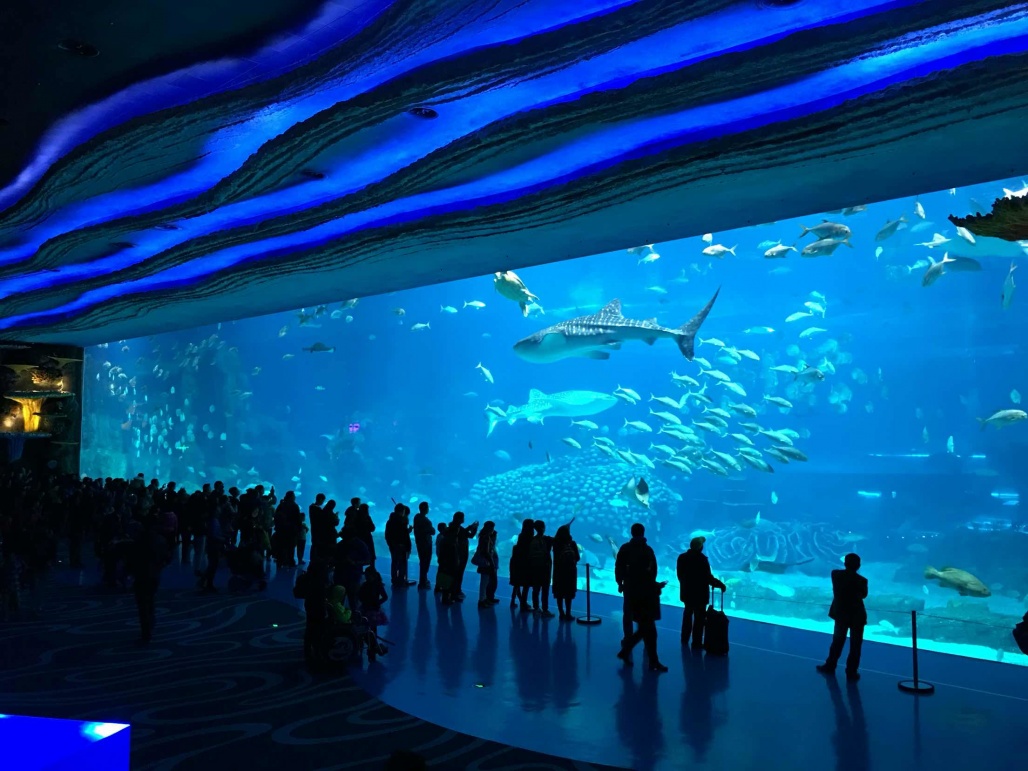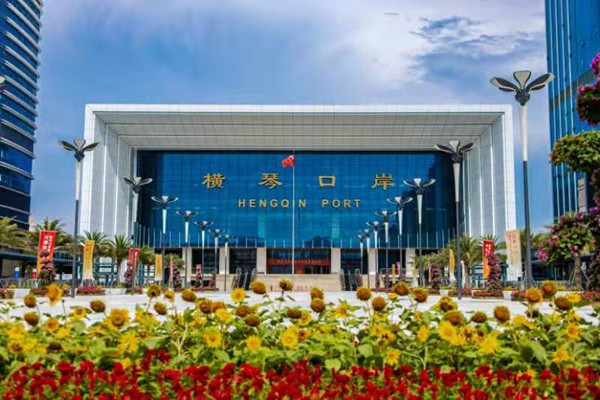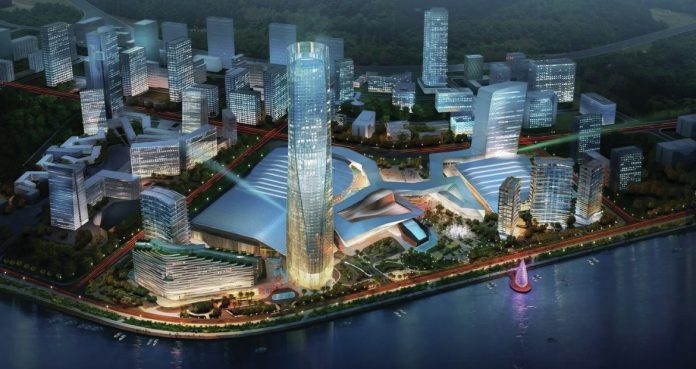The newly implemented Macau-Hengqin multi-entry visa scheme for package tour visitors aims to provide a combination of tourism resources and experiences. It is set to intensify both competition and collaboration
By Therese Tu
Exclusive Macau Business / Macau News Agency
On May 6, Macau welcomed a special group of 16 travellers, the first tour group visiting the city and the neighbouring Hengqin island since the implementation of a new visa policy. The group embarked on a three-day, two-night journey, spending one night in Macau and the other on the island.
The policy that allows them to freely explore both regions is the multiple-entry visa arrangement introduced by China’s National Immigration Administration (NIA) for Chinese nationals traveling on package tours. Under this new visa arrangement, package tour visitors now have the freedom to travel back and forth between the Guangdong-Macau In-Depth Cooperation Zone in Hengqin and the Macau SAR multiple times over a period of seven days.
Also starting on May 6, mainland Chinese individuals holding business visas for Macau will be able to extend their stay in the city by an additional week, from seven to 14 days.
Macau’s tourism authorities said that the measure will contribute to expanding the sources of visitors, promoting integrated development between Macau and Hengqin, and benefiting the business of travel agencies and tour guides on both sides.
Meanwhile, Hengqin’s Economic Development Bureau revealed that several tourism agency operators have already expressed their intention to launch joint Macau-Hengqin tour packages. These operators illustrated that travel itineraries could include daytime activities in Macau, overnight stays at hotels in Hengqin, and visits to Hengqin’s tourist attractions the following day.
For Macau’s tourism, hotel, and MICE industries, this new policy could usher in both opportunities and challenges. Industry representatives expressed their belief that this measure has the potential to act as a catalyst, bringing about enhanced combinations of tourism resources, intensified competition, greater market openness, and a significant milestone in the journey towards a more integrated market.
“The new policy can significantly enhance the travel experience for tourists and help attract more tour groups to visit both Macau and the Cooperation Zone” – Cheung Kin Chung, Chairman of the Association of Macau Tourist Agents

A better package
Leng Sai Wai, Chairman of the Association of Federation of the Industry and Commerce of Macau Tourism, told Macau News Agency (MNA) that Macau lacks children-friendly facilities, particularly in terms of outdoor theme parks, leading to shorter stays for family travellers visiting with children. However, with the multi-entry visa policy in place, he believes this issue can be effectively addressed, as families can now ‘enjoy their time in Macau while taking their children to theme parks in Hengqin’.
The tourism sector representative also emphasised the pressing issue of Macau’s inadequate tourism carrying capacity, which refers to the optimal number of visitors that a specific space can receive at a time without causing a negative impact on the cultural and natural environment.
He highlighted that Macau’s tourism carrying capacity problem is evident in ‘congested transportation’ and ‘overcrowding in popular tourist areas’, particularly during peak periods.
Mr. Leng believes that the new policy will effectively redirect a portion of tourists to Hengqin, providing them with a better tourism experience while simultaneously bolstering Macau’s capacity to accommodate visitors. Meanwhile, the policy is expected to facilitate tourists’ diversion to Hengqin Port for border crossings, thereby alleviating traffic pressure on Gongbei Port, the northern district, and the bridges connecting the peninsula to Taipa.
In recent years, Macau and Hengqin have already established tourism cooperation arrangements, such as joint promotion of’multi-destination travel’ and joint marketing campaigns targeting overseas and mainland markets. Cheung Kin Chung, Chairman of the Association of Macau Tourist Agents and President of the Macau Hoteliers & Innkeepers Association, underscored the potential of the new policy to amplify cooperation between the two regions, foster the integration of their tourism industries, and broaden the range of tourism activities available for Macau.
“The new policy can significantly enhance the travel experience for tourists and help attract more tour groups to visit both Macau and the cooperation zone, achieving mutually beneficial growth for the tourism industry and associated sectors in both regions,” he said.
Macau’s tourism industry is rapidly accelerating its efforts to enhance collaboration with the mainland tourism sector, Mr. Cheung added. The industry insider indicated that in the near future, the tourism sectors of Macau and the mainland will collaborate to introduce a wide range of high-quality travel routes and tourism products, thereby expanding business opportunities through resource integration.
“Families can now enjoy their time in Macau while taking their children to theme parks in Hengqin” – Leng Sai Wai, Chairman of the Association of Federation of the Industry and Commerce of Macau Tourism
Competition or collaboration?
The most notable change is that travellers on package tours can now choose between staying in Macau or Hengqin, has sparked a widespread discussion regarding whether the higher-priced hotels in Macau can maintain their competitiveness. Industry insiders pointed out that while competition may intensify, it could also bring an opportunity for transformation and highlight Macau’s competitive differentiation.
Luis Heredia, President of the Macau Hotel Association, considers that these changes mark the opening up of the market and increased regional competition. He underscored the importance for Macau hotels to continuously improve their service quality and enhance the overall guest experience as Greater Bay Area integration gradually takes shape.
“We fully understand that this is a process, a development in the region, a connection to Macau, step by step,” he said, “We will have to make them more exclusive and work harder. We will have to push ourselves to serve even better.”
As the multi-entry visa arrangement is now limited to package tour travellers, many tour groups and travel agencies tend to choose budget-friendly accommodations in Hengqin to control costs. In light of this, Mr. Leng has called for a further relaxation of the policy to cover individual travellers as well.
According to Mr. Leng, the primary concern for individual travellers differs from that of package tour groups. While cost control remains important for the latter, individual travellers prioritise service quality and hotel amenities. When comparing the facilities and service standards of five-star hotels in the same price range, those in Macau undoubtedly emerge as the more appealing choice.
The local tourism association chairman argues that by expanding the multi-entry visa arrangement to cover individual travellers, more tourists will be able to choose between staying in either Macau or Hengqin based on their specific preferences and needs. Such an expansion would ‘foster differentiated competition’ among hotels in both regions, reducing the need for price wars.
“The competitiveness of Macau hotels is, without a doubt, unmatched in the Greater Bay Area. I believe that if the policy is expanded to include individual travellers, the relationship between Hengqin and Macau will transform into a pure collaboration instead of competition,” Mr. Leng said.
“We fully understand that this is a process, a development in the region, a connection to Macau, step by step (…) We will have to make them more exclusive and work harder. We will have to push ourselves to serve even better” – Luis Herédia, President of the Macau Hotel Association

Multi-venue events
Besides regular tour groups, business tour groups that visit Macau to attend MICE events can also enjoy the convenience brought by the new visa policy. Alan Ho Hoi Ming, Chairperson of the Macao Association of Convention, Exhibition & Tourism Sectors, expressed that this policy change accelerates the development of the multi-venue event model. He predicts that the number of multi-venue events held this year will double compared to the previous year’s record of 12.
“This policy is a significant boon for the MICE industry in both Macau and Hengqin, injecting new energy into its development,” Alan Ho said.
He highlighted the advantages of the multi-venue event model, which expands the range of venues available for hosting MICE events while diversifying the types of events that can be held. For instance, Macau has limited outdoor venues, whereas Hengqin boasts several natural parks. Therefore, Macau’s MICE events can leverage the spaces in Hengqin to host outdoor activities such as camping and RV shows.
The MICE industry insider further noted that the new policy addresses the issue of hotel room shortages for hosting MICE events during the peak tourism season in July and August. With over 9,000 hotel rooms in Hengqin, the neighbouring island can alleviate the strain faced by Macau. Also, while hotel room prices in Cotai can skyrocket to MOP 2000–3000 during the summer holiday period, Hengqin offers more affordable rates ranging from MOP600–700.
Alan Ho expects a deepening collaboration between Zhuhai and Macau in the MICE sector as policies gradually ease. The MICE sector insider indicated that in the near future, numerous conferences, exhibitions, sports events, and performing arts activities are poised to harness the resources of both regions and foster integrated development.
“This policy is a significant boon for the MICE industry in both Macau and Hengqin, injecting new energy into its development” – Alan Ho Hoi Ming, Chairperson of the Macao Association of Convention, Exhibition & Tourism Sectors
Macau
Visitors (2023):
Hotel rooms 47,000
Source: Statistics and Census Service
Hengqin
Visitors (2023): 11.6 million*
N. of hotel rooms: 9,000+**
*Number of visitors Hengqin’s tourist attractions received, according to authorities
** Industry sources
























